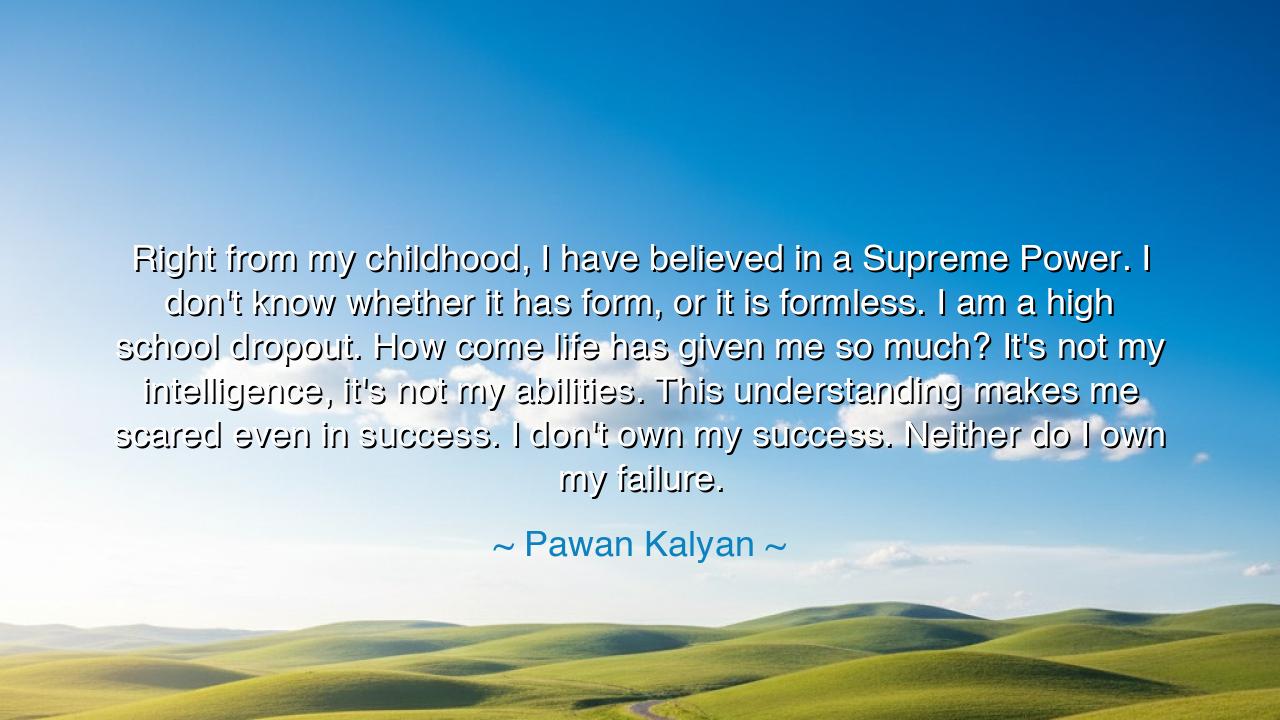
Right from my childhood, I have believed in a Supreme Power. I
Right from my childhood, I have believed in a Supreme Power. I don't know whether it has form, or it is formless. I am a high school dropout. How come life has given me so much? It's not my intelligence, it's not my abilities. This understanding makes me scared even in success. I don't own my success. Neither do I own my failure.






From the words of Pawan Kalyan, we hear a profound understanding of the Supreme Power that governs not only the cosmos but also the very lives of men and women. He speaks not of a force that is bound by form or shape, but of a presence that is intangible, unknowable, and yet all-encompassing. From his humble beginnings as a high school dropout to his immense success, Kalyan reflects on the paradox of life—how the success he has achieved is not of his own doing, nor is the failure he has faced entirely his fault. In these words, there is an echo of a timeless truth: we are but vessels, carried by a force greater than ourselves, and though we may steer the ship, we do not chart the course.
This recognition of the Supreme Power is not the understanding of a casual observer, but of one who has felt the invisible hand that guides him, that shapes his destiny. Success, in this context, becomes a paradox—a gift, not a triumph. It is a divine blessing, bestowed not because of one's skill or intelligence, but because there exists a higher purpose, a cosmic order that moves in ways unseen. The great philosophers of the ancients spoke of a higher intelligence, one that governs the universe with wisdom, allowing men to rise, fall, and rise again. The Stoics, like Epictetus, taught that while we may control our actions, the outcome of those actions lies in the hands of a higher power.
Consider the example of Socrates, the great philosopher who, despite his wisdom, was sentenced to death by the Athenian court. He did not despair nor fight against the judgment, for he understood that the course of his life, and even his death, was not his to control. Socrates’ famous words, “I know that I know nothing,” echoed the truth that our understanding is but a fragment of a much larger tapestry. Similarly, Kalyan’s recognition that he does not “own” his success or failure speaks to the humbling realization that we are, in the end, only instruments through which the Supreme Power plays its song.
In the midst of success, there is a unique humility that Kalyan expresses. He is scared not by the grandeur of his achievements, but by the awareness that they are not his alone. Success, in the eyes of many, is the ultimate validation of one’s worth, a moment to bask in the glory of one’s accomplishments. But Kalyan, in his wisdom, acknowledges that such moments of triumph are fleeting. The true meaning of success lies not in ownership, but in the grace with which we receive it. Failure, too, is not a mark of one’s inadequacy but a lesson, a stepping stone, a part of the process that leads to greater understanding.
This understanding of non-attachment is echoed in the teachings of the Buddha, who spoke of detachment as a means of achieving true peace and wisdom. The Buddha taught that we must learn to be free from the chains of desire—whether that be for success, wealth, or fame. To Kalyan, success and failure are but fleeting moments on the path of life. They are not to be clung to, for in clinging, we lose the very essence of what it means to be human: to experience, to learn, and to grow.
Thus, the lesson to be drawn from Pawan Kalyan’s reflection is one of deep humility and faith. It is a call to recognize the limits of our control and to understand that we are but instruments of a greater will. This recognition brings peace and freedom, for in acknowledging that we do not own our successes or failures, we free ourselves from the weight of expectations and the burden of self-doubt. It is not our intelligence or our abilities that shape our lives, but the grace and wisdom of the Supreme Power that guides us.
The practical action we can take is to live with a heart full of humility, understanding that every triumph and setback is a part of the grand design. We must cultivate gratitude for all that we are given, knowing that it is not ours to claim. In every moment of success, let us remember that it is a gift, not a possession. In every moment of failure, let us see it as a lesson, not a condemnation. And in this, we shall walk the path of wisdom, guided by a higher hand, and at peace with the mystery that surrounds us.






AAdministratorAdministrator
Welcome, honored guests. Please leave a comment, we will respond soon